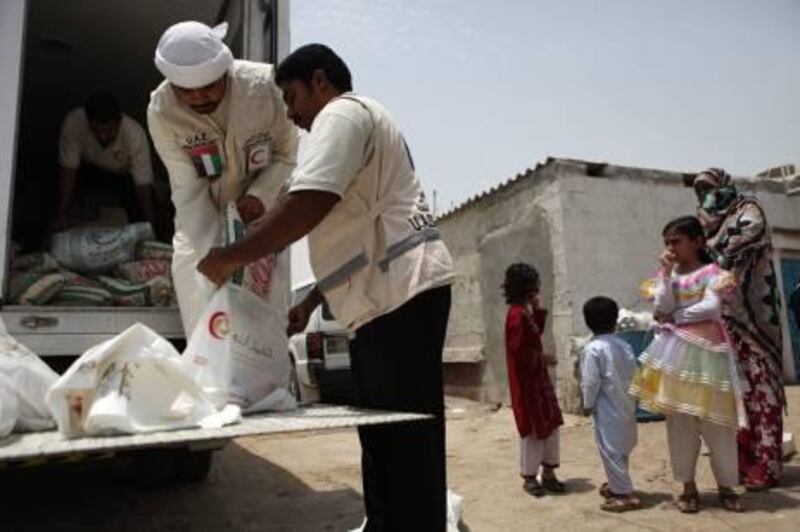ABU DHABI // The UAE Red Crescent Authority (RCA) aims to top the Dh30 million spent last year to help the less fortunate enjoy Eid al Adha.
One of the goals of this year's Adahi campaign is to send as many people as possible on Haj and distribute gifts and goats to the poor.
"According to religious beliefs, Eid means happiness, so everybody should be happy, because there is no sad Eid," said Mohammed al Qamzi, secretary general of the RCA, yesterday at the launch of the drive. "That's why we are always keen on providing the poor and needy with what they need to enjoy the holy event."
A major part of the campaign sponsors people to perform Haj. It must be the first time for those chosen to have undertaken the pilgrimage to Mecca in Saudi Arabia. "Usually most pilgrims are non-Emirati, because most Emiratis can pay their own expenses," said Mohamed al Hamadi, deputy secretary general for local affairs.
The cost this year will be Dh24,000 to fly to Mecca, or Dh13,000 to go by land. The number of pilgrims to be sent has not been decided yet, nor did the Red Crescent provide a tally of last year's beneficiaries.
"We try to send as many as we can, but I don't think we'll be able to send as many as we used to a few years ago because the expenses of Haj keep increasing," Mr al Hamadi added.
Those Muslims in need who stay at home will also benefit from the RCA's programme. Meat will be given out to orphans, widows and poor families as well as cash, clothing and other Eid requirements. An Eid donation is usually between Dh200 to Dh700 for a family, and between Dh25 to Dh200 for individuals.
Each year, Muslims sacrifice animals and distribute food to the needy on the first day of Eid al Adha, which marks the end of the Haj pilgrimage. The festival is a reminder of when God tested the Prophet Ibrahim by ordering him to sacrifice his son Ismail. Ismail was saved after God provided Ibrahim with a sacrificial sheep instead. "There are people who eat meat once a year only," said Ahmad al Mazroui, chairman of the RCA.
"When God ordered us to sacrifice meat it did not come out of nowhere, because God knows that there are people who need the protein in meat but cannot afford it. Don't think if you can eat meat every day, that everybody else can."
The RCA increased the amount donated for sacrifices this year, from Dh500 to Dh750 in Dubai and Abu Dhabi, and to Dh550 in the Northern Emirates.
"Because of inflation, we noticed last year that the quality of the meat was not the best, so this year we increased the value of the sacrifice because it is our duty to provide the best quality," Mr al Qamzi said. He stressed that any amount, even a couple of dirhams, was enough to make others happy, urging people of all ages and income to donate.
Shaima Abdulghafour, a ninth grade student in Al Thebyaneya Public School for girls, has been leading a team of 30 pupils to collect donations for RCA campaigns.
"We started the group three years ago to encourage students to contribute to Red Crescent campaigns," the 14-year-old Syrian said. "We encourage them to give away extra food and clothes that they have, and not only cash."
Mr al Mazroui said the group was illustrative of the authority's expanding reach as it sought donations from all segments of society, including students.







